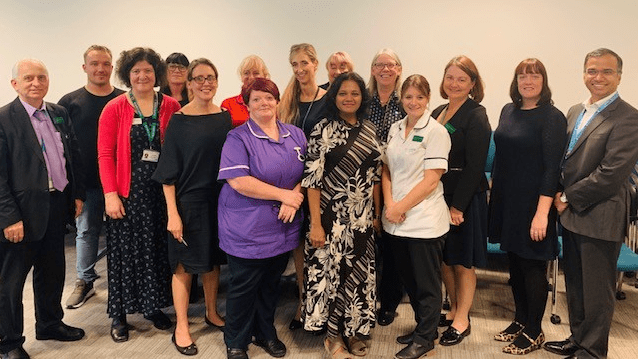The Freedom to Speak Up team at Northern Care Alliance (NCA) are committed to using speaking up as a tool for improving organisational culture. Their approach led them to be shortlisted for the Freedom to Speak Up Organisation of the Year Award at the 2020 HSJ Awards.
Dr Tina Chrysochou, Freedom to Speak Up Guardian at NCA, said, “Having the Freedom to Speak Up is important in any workplace. But in health, the consequences of not speaking up can impact on patient safety. Using our Freedom to Speak Up model across our organisations allows us to make improvements for both patients and workers.”
NCA comprises two acute Trusts: Salford Royal NHS Foundation Trust and The Pennine Acute Hospitals NHS Trust. It covers five hospitals, as well as associated community services. The Freedom to Speak Up team at NCA was set up in 2016 with the ambition of creating a robust Freedom to Speak Up service. The model includes empowering those who speak up and holding a mirror to the organisation in order to improve the organisation’s speaking up culture. Using quality improvement methodology, Tina’s team applied this to make improvements to three care organisations within NCA which were rated inadequate by the CQC.
Leadership support is essential to improving organisational culture, and the executive team at NCA is committed to Freedom to Speak Up. The CEO consistently endorses the role of Freedom to Speak Up Guardians in an organisation-wide blog. Tina and the Freedom to Speak Up team also regularly report to the Board.
The five lead Freedom to Speak Up Guardians in the care organisations in NCA meet monthly with each Associate Director of Governance and Workforce. When a concern is raised, it is logged in a database to identify themes, including where this is a risk to patients or workers. This feedback is collated, anonymised and sent to the executive team. The speaking up data is triangulated with the themes identified in the concerns raised to create a ‘lessons learned’ approach. Action is then taken across the NCA organisations to maintain a consistent and continuously improving speaking up model.
An example of how Freedom to Speak Up is making a difference at NCA is illustrated by how improvements were made to a ward where patient safety concerns were being raised. The team members on this ward were reticent to speak up as they felt unsupported or that they wouldn’t be listened to. They spoke up to the Freedom to Speak Up team about working excessive hours and lacking appropriate training. The Freedom to Speak Up team escalated the matters and facilitated an open discussion to enable a resolution. The ward leaders focussed on recruitment and making workers feel more valued. The Freedom to Speak Up team remain engaged with this ward to ensure there is always the option of speaking up.
In another ward, workers spoke up about morale and quality of care. A Freedom to Speak Up support session highlighted that Health Care Assistants were unaware of how and when to use the Adverse Incident Reporting system. This sparked a Trust-wide training initiative to educated Health Care Assistants on this. The success of this initiative led to the Freedom to Speak Up team being asked to conduct the same approach in two other clinical areas.
NCA has demonstrated a commitment to improve the speaking up culture across its organisations so that patients receive the best possible care and workers are supported. The success of implementing one model across the organisations has seen the CQC rating for The Pennine Acute Hospitals NHS Trust rise from inadequate to good. Freedom to Speak Up Guardians at NCA ask the workers they support for their feedback. All the workers who responded said they were satisfied with the service and would speak up again.
The Freedom to Speak Up peer support model allows for cohesive working across all of NCA’s care organisations. This provides the Freedom to Speak Up team with a valuable forum to debrief, a support network and it helps to ensure consistency of approach.
Transparency is another important element of the approach at NCA. The team publishes quarterly newsletters, sharing real-life case studies, to show how speaking up has inspired change, to reduce the barriers around speaking up and to promote the value of doing so.
Tina said, “The Freedom to Speak Up service encourages everyone to call out behaviour that may cause patient safety compromise, but equally ensure robust investigations are undertaken in a timely manner with good communication to all parties involved. As we appreciate this can sometimes be difficult to do, we are an independent avenue for anyone who wishes to raise a concern or where a concern has not been adequately responded to. The FTSU service is a ‘peer with an ear’”.
